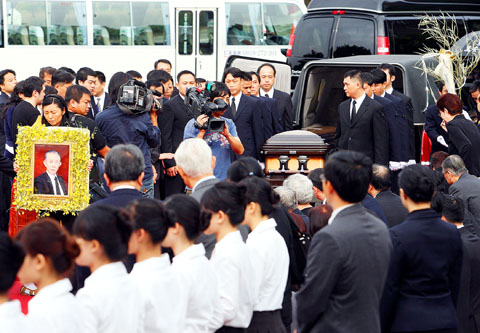The “God of Business,” whose enterprises stretched from plastics and petrochemicals to high technology and biomedical sciences, was also instrumental in reshaping the nation’s medical map.
Wang Yung-ching (王永慶), founder of Formosa Plastics Group (台塑集團) — the most financially successful business group in the country — died in New Jersey on Thursday at the age of 91.
Wang founded the Chang Gung Memorial Hospital in Taipei in 1976 to provide healthcare for the middle-class and less privileged citizens, for whom there was no access to affordable good medical care prior to the 1970s.

PHOTO: CNA
The Chang Gung Memorial Hospital was Taiwan’s first general hospital for ordinary people and the first teaching hospital at which doctors would not expect “red envelopes” from the relatives of their patients.
In establishing Chang Gung hospital, Wang spared no funds — earned from his business operations — hiring top-notch medical professionals and management personnel from both home and abroad.
At the same time, he also established a medical university and a nursing college to train medical professionals.
In less than 30 years, Chang Gung Memorial Hospital — which now has branches in Linkou (林口), Kaohsiung County, Taipei County, Keelung City and Xiamen, China — has become the largest hospital in Taiwan in terms of its number of beds and doctors, and is considered the nation’s best medical institution in terms of business management.
Inspired by Chang Gung’s successful business management model, other privately owned hospitals have been established around the nation in the past decade, a development that has reshaped Taiwan’s medical map. In the 1970s, the ratio of public to private hospitals was eight to two, but that figure has since been reversed and is now two to eight.
As the biggest hospital chain, Chang Gung hospitals now have the largest number of National Health Insurance Program (NHIP) holders, commanding between 8 percent and 9 percent of NHIP expenditure, an average of around NT$450 billion (US$13.88 billion) a year.
The Chang Gung business model has inspired National Taiwan University Hospital (NTUH) — the nation’s top public teaching hospital — to change its management style.
Emulating Chang Gung, several years ago NTUH began to expand its operations and now has many branches scattered around the country.
In his bid to make Chang Gung a first-class medical institution, Wang installed the most advanced equipment and facilities at the hospitals. The facilities included an operating theater and ward exclusively for patients with congenital heart disease, an operating theater and ward exclusively for children with craniofacial defects and a clinic for the implant of electronic ears for children with acoustic nerve defects.
Wang, who was a victim of streptococcus pneumoniae, donated NT$500 million earlier this year so that people over the age of 75 could receive the streptococcus pneumoniae vaccine for free.

Palauan President Surangel Whipps Jr arrived in Taiwan last night to kick off his first visit to the country since beginning his second term earlier this year. After arriving at Taoyuan International Airport at around 6:30 pm, Whipps and his delegation were welcomed by Minister of Foreign Affairs Lin Chia-lung (林佳龍). Speaking to gathered media, the Palauan leader said he was excited and honored to be back in Taiwan on his first state visit to Taiwan since he was sworn in this January. Among those traveling with Whipps is Minister of State Gustav N. Aitaro, Public Infrastructure

RESOLUTIONS DEBATE: Taiwan’s allies said that UN and WHA resolutions cited by China and other nations ‘do not determine Taiwan’s participation in WHO activities’ A proposal to invite Taiwan to this year’s World Health Assembly (WHA) was rejected on Monday, resulting in Taipei’s absence from the annual meeting for a ninth consecutive year, although partners spoke up for Taiwan’s participation at the first day of the meeting. The first agenda item after the opening was a “two-on-two debate” on a proposal to invite Taiwan to participate at the WHA as an observer. Similar to previous years, two countries made statements in favor of the proposal, while two others expressed their opposition. Philippine Secretary of Health Teodoro Herbosa, president of the 78th WHA, accepted the WHA General Committee’s

Premier Cho Jung-tai (卓榮泰) on Friday laid out the Cabinet’s updated policy agenda and recapped the government’s achievements ahead of the one-year anniversary of President William Lai’s (賴清德) inauguration. Cho said the government had made progress across a range of areas, including rebuilding Hualien, cracking down on fraud, improving pedestrian safety and promoting economic growth. “I hope the public will not have the impression that the Cabinet only asked the legislature to reconsider a bunch of legal amendments,” Cho said, calling the moves “necessary” to protect constitutional governance and the public’s interest. The Cabinet would work toward achieving its “1+7” plan, he said. The

At least three people died and more than a dozen were injured yesterday afternoon when a vehicle struck a group of pedestrians in New Taipei City’s Sansia District (三峽). The incident happened at about 4pm when a car rammed into pedestrians at an intersection near Bei Da Elementary School. Witnesses said the sedan, being driven at a high speed, ran a red light, knocking scooters out of the way and hitting students crossing the road before careening into a median near the intersection of Guocheng and Guoguang streets. The incident resulted in three deaths and 13 injuries, including the driver, a 78-year-old man